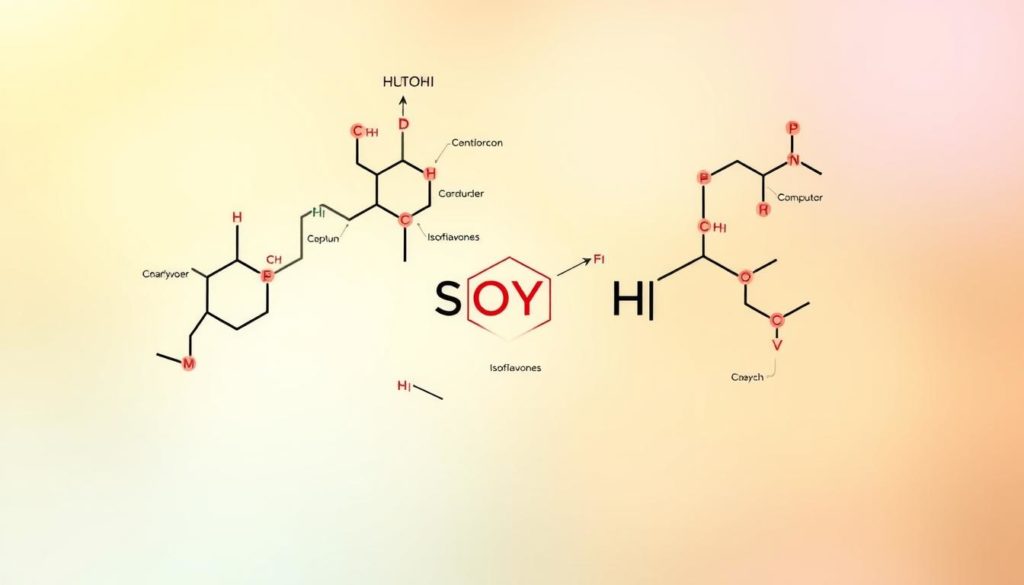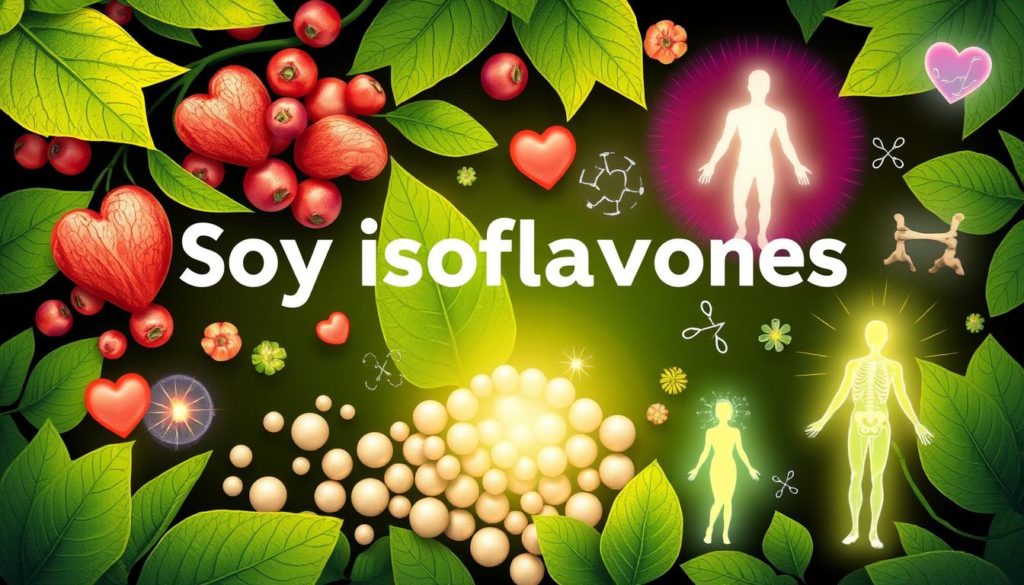“Let food be thy medicine and medicine be thy food.” – Hippocrates
Soy isoflavones are natural compounds from soybeans and are known for their health benefits. They’ve become very popular for improving health. This article will cover their health benefits and how they are used, all backed by science.
Looking to improve your heart health, handle menopause symptoms, or enhance fertility? Soy isoflavones could be key. You’ll find out how to use them safely, understand their effects on estrogen, and learn any side effects. This guide has everything you need to add these compounds to your diet.
What Are Soy Isoflavones?
Soy isoflavones are natural compounds found in soybeans. They are known for their health benefits. These compounds act like weak estrogen in our bodies.

Definition and Origin
Soy isoflavones come mostly from soybeans. They are called phytoestrogens. This is because they act like estrogen in our bodies. Soybeans are a great source of these helpful compounds.
Chemical Composition
The main isoflavones in soy are genistein, daidzein, and glycitein. They are similar to estrogen. This similarity lets them bind to estrogen receptors. Because of this, they help with menopause symptoms and heart health.
Health Benefits of Soy Isoflavones
Soy Isoflavones are natural compounds in soybeans. They are known for their amazing health benefits. This includes better heart health and stronger bones. Let’s look closer at these benefits, which science supports.

Cardiovascular Health
Soy isoflavones can greatly benefit our hearts. Scientists believe they reduce heart disease risk. They improve cholesterol and help keep blood vessels healthy.
- Lowering bad LDL cholesterol
- Increasing good HDL cholesterol
- Improving elasticity of blood vessels
These benefits suggest soy isoflavones are good for heart health. Clinical trials back this up, showing they make our hearts healthier.
Bone Health
Soy isoflavones also support bone health. They’re particularly helpful for those at risk of bone loss. They help keep and improve bone strength.
A study in The Journal of Nutrition showed soy isoflavones can prevent bone loss. They work like estrogen, boosting bone growth and stopping bone loss. This leads to stronger bones.
- Prevention of bone resorption
- Promotion of bone formation
- Increased overall bone density
| Health Benefits | Impact |
|---|---|
| Cardiovascular Health | Reduced risk of heart disease |
| Bone Health | Improved bone density |
To sum up, soy isoflavones offer many health benefits. They help our hearts and bones. Adding soy to our diet can be a smart choice for our health.
Soy Isoflavones for Menopause Management
Menopause brings various symptoms that drastically change daily life for many women. Soy isoflavones offer a natural way to ease these effects. They help by acting like estrogen in the body, which is key in lessening menopause signs. This is especially true for hot flashes and hormone balance.
Reducing Hot Flashes
Hot flashes are a big menopause challenge. Soy isoflavones can cut down on their frequency and harshness. They work with the body’s estrogen receptors to reduce the sudden warmth of hot flashes. Adding soy foods like tofu and soy milk to meals can help naturally manage these symptoms.
Hormonal Balance
It’s vital to keep hormones in check during menopause. Soy isoflavones aid in this, reducing many related symptoms. They fill in for natural estrogen, making menopause smoother. Studies show that women who eat soy products face fewer hormonal issues.
| Symptom | Benefit of Soy Isoflavones | Example Soy Products |
|---|---|---|
| Hot Flashes | Reduced frequency and severity | Tofu, Tempeh |
| Hormonal Imbalance | Stabilized hormone levels | Soy Milk, Edamame |
| Mood Swings | Improved mood stability | Miso Soup, Soy Nuts |
Soy Isoflavones for Fertility
Recently, the focus has turned to Soy Isoflavones and their link to fertility. Researchers are diving into how these natural elements could help with having a baby. They are known for potentially making ovulation better and improving how well sperm works.
Effect on Ovulation
Studies show soy isoflavones could improve ovulation. As phytoestrogens, they act like estrogen in the body. They might help balance hormones, helping women with irregular ovulation cycles.
Impact on Sperm Quality
For men, soy isoflavones could boost sperm quality. They may guard sperm against harm and make them healthier. Though more studies are needed, the current results are hopeful. They hint at soy isoflavones helping men’s fertility.
Popular Soy Isoflavones Supplements
Looking to enhance your diet? Soy Isoflavones supplements can be a great addition. Many brands offer different options. These can boost bone health or help with menopause symptoms. Here, we give you an overview to help pick the best isoflavone supplements for you.
Think about the concentration, type of formulation, and extra ingredients when picking Soy Isoflavones supplements.
| Brand | Concentration | Formulation Type | Additional Ingredients |
|---|---|---|---|
| Nature’s Way | 60 mg | Capsules | Calcium, Vitamin D |
| Solgar | 55 mg | Tablets | Vitamin B12 |
| NOW Foods | 80 mg | Softgels | None |
| GNC | 75 mg | Caplets | Bioperine |
Choosing the right supplement means looking at these factors carefully. You want benefits like easing menopause or better bone density. The best isoflavone supplements fit your health needs and what you like to eat.
Soy Isoflavones Research and Studies
Recent findings in soy isoflavones research have highlighted their broad health benefits. This includes effects on plant resistance and their role as phytoestrogens. Many scientific studies on isoflavones focus on their creation and use in the body, underlining their importance in health.
Studies are looking into how soy isoflavones may prevent breast cancer. They’re examining how our bodies process these compounds and the role of equol. Also, the influence of gut bacteria on isoflavones is being studied, shedding light on their benefits.
In the heart health area, soy isoflavones might help lower heart disease risk. They’re also seen as protective for our brains and may help avoid obesity and diabetes. For example, Korean women with high isoflavone levels in their blood show a lower diabetes risk, showing the importance of isoflavones in health.
The broad scope of soy isoflavones research shows the importance of further study. Scientists continue to uncover how soy isoflavones can benefit us in many ways, suggesting their potential goes beyond current knowledge.
Soy Isoflavones Dosage Guidelines
Getting the right Soy Isoflavones dosage is key to enjoying its perks. Factors such as age, health, and what you eat matter. It’s vital to find the right daily amount for you.
Recommended Daily Intake
Adults should aim for 30 to 50 milligrams of isoflavones each day. This amount is found in soy foods like tofu, soy milk, and edamame. Always talk to a doctor before starting any supplements.
Considerations for Different Age Groups
Kids, expecting moms, and seniors need varied amounts. Children’s doses are smaller, based on their weight. Pregnant ladies should get medical advice to stay safe. Seniors might stick to the lower end to benefit bones and heart health.
| Age Group | Daily Intake of Isoflavones (mg) |
|---|---|
| Children | 10-20 |
| Adults | 30-50 |
| Pregnant Women | Consult a Healthcare Provider |
| Older Adults | 30 (to start) |
Choosing the right Soy Isoflavones dose for your needs brings many benefits. Always lean on solid research and expert advice in your decision-making.
Soy Isoflavones and Estrogen Levels
The link between soy isoflavones and estrogen is quite interesting. Soy isoflavones are known for their estrogen-like behavior. This makes them sought after by those looking to balance hormones. Learning about these compounds helps us see their possible health effects.
Estrogenic Activity
Soy isoflavones act like phytoestrogens. This means they can copy estrogen in our bodies. They connect to estrogen receptors and can act like estrogen, but weaker. This lets soy isoflavones help balance estrogen, especially when it’s low.
Impact on Men and Women
How soy isoflavones affect hormones can change between men and women. For women, they help with menopause symptoms like hot flashes and bone loss. This is due to their mild estrogen effect. For men, soy isoflavones are beneficial too. They don’t badly affect testosterone levels. This makes them safe for promoting health and lowering cancer risks.
Let’s dive deeper into isoflavones and hormones:
| Factors | Women | Men |
|---|---|---|
| Hormonal Balance | Supports estrogen balance | Minimal impact on testosterone |
| Menopause Symptom Relief | Reduces hot flashes | N/A |
| Bone Health | Improves bone density | Maintains muscle mass |
Soy isoflavones have multiple uses, from menopause management to improving health. By knowing how they interact with hormones, people can choose to include them in their diets wisely.
Potential Side Effects of Soy Isoflavones
Soy isoflavones can lead to side effects for some people. It’s important to know these effects to make smart choices.
Common Side Effects
Some might face mild stomach issues like bloating, constipation, or diarrhea. This usually happens because the body is adjusting to more soy. Others might have allergic reactions if they’re allergic to soy.
Long-Term Effects
The long-term safety of isoflavones is currently debated by experts. Research shows both benefits and risks from using them for a long time. For example, they could help with bone health and reduce menopause symptoms. However, there’s worry about thyroid health and hormone balance.
| Concerns | Details |
|---|---|
| Thyroid Function | Eating too many soy isoflavones might hurt thyroid hormone production, particularly if you already have thyroid issues. |
| Hormonal Imbalance | Some research says isoflavones can act like estrogen. This may help with menopause but could affect hormone-sensitive conditions. |
Knowing the risks and benefits of isoflavones helps people decide wisely about adding them to their diet. This balance is key.
Final Thoughts on Incorporating Soy Isoflavones in Your Diet
Soy isoflavones bring lots of potential health benefits to the table. They can boost heart and bone health, and help manage menopause. Knowing the many effects of soy isoflavones helps us decide how best to add them to our diets. This knowledge comes from studies on humans and animals.
Adding soy isoflavones to your diet should be done with care. You can get them from foods like soybeans and other legumes, or supplements. Make sure your diet stays balanced. Knowing how soy isoflavones interact with things like calcium supplements is key to a good diet plan.
If you want to dive deeper into the science, many studies talk about how isoflavones work differently in various species. They also look at how these compounds affect gut health and reproduction. For more in-depth information, you can check out comprehensive studies here. Being informed and careful with your choices is important when including soy isoflavones in your diet for health benefits.
FAQ
What are soy isoflavones?
Soy isoflavones are found in soybeans. They’re like the hormone estrogen. They can mimic or affect estrogen’s role in our bodies.
What are the health benefits of soy isoflavones?
Soy isoflavones help keep your heart healthy and bones strong. They ease menopause symptoms. They also might lower cholesterol and cancer risk.
How do soy isoflavones help with menopause symptoms?
Soy isoflavones ease menopause symptoms, such as hot flashes. They act like estrogen. This balances hormone levels, easing menopause troubles.
Can soy isoflavones improve fertility?
Some studies say soy isoflavones could boost ovulation and sperm quality. This might help with fertility. Yet, we need more studies to be sure.
Are there popular soy isoflavone supplements available?
Yes, you can find many soy isoflavone supplements. Look for ones with good concentration and quality. This ensures they work and are safe.
What does current research say about soy isoflavones?
Research shows soy isoflavones have health benefits. But findings aren’t the same everywhere. Studies are ongoing to learn more about how they help.
What is the recommended daily intake for soy isoflavones?
People often take 40 to 80 mg of soy isoflavones daily. But, listen to health experts. They’ll advise based on your health needs.
How do soy isoflavones affect estrogen levels?
Soy isoflavones can act like or block estrogen in your body. Their effects vary between men and women. They can change hormonal health.
What are the potential side effects of soy isoflavones?
Taking soy isoflavones might cause bloating or constipation. Their long-term effects are different for everyone. Watching your health while taking them is important.


